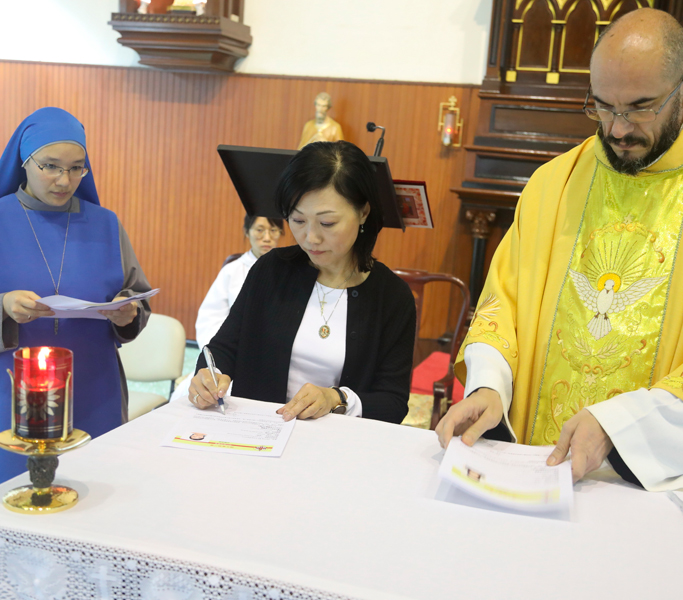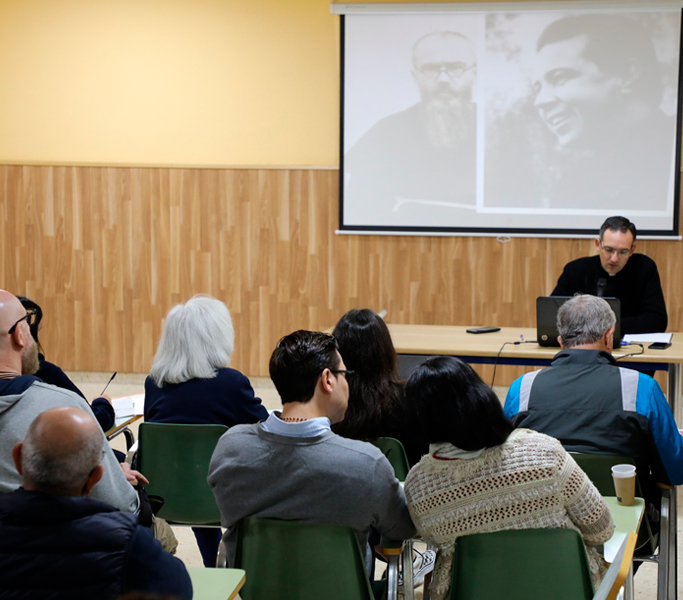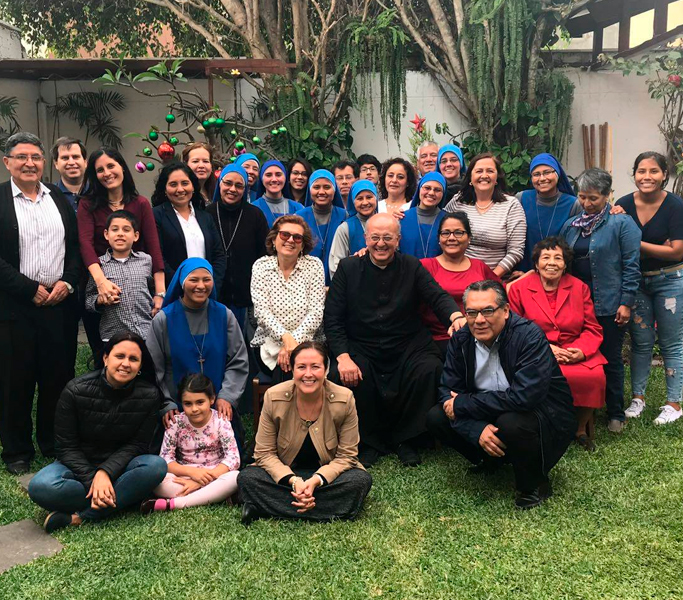Diversity of Vocations
Within the lay life, the Spirit is not limited to a law or a rule, but continually raises up in the Christian life different calls or vocations, like different paths that are directed to God. The rich variety of the Church finds its ulterior manifestation within each one of the states of life and thus, within the state of lay life there are various “vocations,” that is, various spiritual and apostolic paths that affect each one of the lay faithful[1].
Desiring to make room for these different lay vocations, the Third Order Secular of the Religious Family of the Incarnate Word is structured in levels according to the degree of commitment the members give to our Religious Family. According to their calling, they participate in and increase the spiritual treasure of the different branches already founded so that all, in their measure, do good and produce fruits of holiness. The Church is like a fascinating and wonderful field with a variety of herbs, plants, flowers and fruits. That is why it is our wish that “here you may see the shoot of virginity like spring flowers; there, as if in a glade, grave and forceful widowhood; elsewhere, the Church’s marriages, like a cultivated plot whose abundant harvest fills the granary of the world, or whose vines fill to overflowing the winepress of the Lord Jesus with the offspring of faithful wedlock.”[2]
St. Francis de Sales taught, Christians carry out the common vocation to holiness in a specific way: “In creation God commanded the plants to produce their fruits, each according to its species (Gen 1:11). The same command directs Christians, who are living plants of their Church, to produce fruits of devotion, each according to its state and condition. Devotion must be practiced in a different way by the gentleman, by the artisan, by the servant, by the prince, by the widow, by the single woman and by the married woman. But that is not enough; it is also necessary to reconcile the practice of devotion with the forces, with the obligations and duties of each person. It is a mistake … -better said, a heresy- to try to exclude the exercise of devotion from the military environment, from the workshop of the artisans, from the court of the princes, from the homes of the married. It is true that purely contemplative, monastic and religious devotion can only be lived in these states, but in addition to these three types of devotion, there are many others capable of perfecting those who live in secular conditions. Therefore, wherever we are, we can and should aspire to the perfect life.”[3]
The Third Order Secular wishes to welcome into its bosom the various lay vocations that, while maintaining their own natures and ends, want to actively participate it the spirit of the Religious Family of the Incarnate Word and of the spiritual treasures that God, in his mercy, pours on it. At the same time, they want to contribute to the increase of this spiritual wealth, with their prayers and sacrifices.
Therefore, every one must live their vocation in the proper way, bearing their own imprint on it, in harmony with the charism that the Holy Spirit has wished to arouse in our Religious Family of the Incarnate Word, with whom they are intimately united, so that all are speaking the truth in love, we are to grow up in every way into him who is the head, into Christ, from whom the whole body, joined and knit together by every joint with which it is supplied, when each part is working properly, makes bodily growth and upbuilds itself in love (Eph 4:15-16).
The laity of the Incarnate Word should be characterized by a deep devotion to the mystery of the Incarnation, the summit of all mysteries, which should enlighten all their lives, and dominate all reality in the light of the Incarnate Word, carrying the mystery of Christ until the end, so that Christ is “all in all.” Knowing that the essence of their vocation is anchored in God become man.
All the members of the association must seek spiritual ascent until they reach the summits of holiness. Without that aspiration and constant tendency, although perhaps by word they say that they belong to the Institution, they are like dead members, like the dry clusters of the vine.[4]“Everyone is invited by God to walk the path of holiness and to bring his companions in life and work to this path in the temporal order.”[5]
Secular Nature
“[T]he laity, by their very vocation, seek the kingdom of God by engaging in temporal affairs and by ordering them according to the plan of God. They live in the world, that is, in each and in all of the secular professions and occupations. They live in the ordinary circumstances of family and social life, from which the very web of their existence is woven. They are called there by God that by exercising their proper function and led by the spirit of the Gospel they may work for ‘the sanctification of the world from within as a leaven.’ 421 However, lay secularity, that is, the being and acting of the laity in the world, is not only an anthropological and sociological reality, but also and specifically theological and ecclesial, insofar as it must be understood in the light of creation and of redemption, so that all created reality is destined to find in Christ the fullness of its meaning, and the laity, as active members of the Church, in fulfilling their mission in the world, have a role of their own, in the complementarity between the various categories of the faithful. 422 The scope of the temporal order, which embraces the secularity proper to the lay faithful, is the property of life, of the family, of culture; the sphere of economics and politics; the world of work, of the arts and professions; the field of science, of technology, of ecology, of social communication; the problems of life, of professional ethics, of solidarity, of peace, of the institutions of the political community; international relations and their evolution and progress; the promotion of justice, of the rights of man, of education and of freedoms, especially religious. [6]”[7]
Marriage Vocation
Marriage is the sacrament proper to the laity, and is the ordinary means for them to be sanctified in the world, although obviously, it is not the only or exclusive way.
Married couples of the Third Order Secular must be aware that their testimony of life is a richness and an encouragement for the whole family of the Incarnate Word.
We want the marriages of the family of the Incarnate Word to shine like torches in this atheistic and materialized world, which judges and holds these things to a high standard:
- contraception as a method;
- birth control as a solution;
- infidelity as a virtue;
- the false emancipation of women as an ideal;
- providing the so-called “secular marriage,” which secularizes and desacralizes the sacred reality of Catholic marriage
Therefore, we want to bear witness before the world:
- that it is possible to embrace the demands of the gospel without fear or reservations, in imitation of the Holy Family;
- that it is possible to live the spirit of the beatitudes in marriage, taking them to their ultimate ends.
To the worldly standard we respond with the genuine and authentically fulfilled teachings of the Gospel, proposing:
- responsible parenthood over children;
- God does want large families, not only accepting the idea of children, but also the desire for them;
- mutual love as a bastion to all infidelity and every temptation of division or fracture; – the dignity of woman;
- marriage lived as a sacred reality, elevated by Christ to the dignity of a sacrament, a true school where the saints that the Church expects from every Christian home are forged.
“There are three goods to marriage: offspring, fidelity and the sacrament.”[8]
Children
This is the best gift with which God can reward marriage. That is why it is a grave mistake to believe, as many argue, that the Church considers those who have a large family irresponsible.
All of Sacred Scripture, from the increase and multiply (Gen 1:28) of Genesis to the New Testament, is full of “numerous texts that exalt the fecundity of the family and assure to the numerous families the continued assistance of Providence.”[9]
The Second Vatican Council especially praises spouses who are generous in the transmission of life, with the following words: “…those merit special mention who with a gallant heart and with wise and common deliberation, undertake to bring up suitably even a relatively large family,”[10] and Pius XII said that large families are “…the most blessed by God, favored and esteemed by the Church as precious treasures… history does not err when it fails to observe the laws of marriage and procreation the first cause of the decline of the people… in homes where there is always a cradle that swings the virtues flourish spontaneously… the well ordered numerous family is almost a visible sanctuary.. they are the most splendid schools of the Church, in which, as in favorable terrain, joy blossoms and sanctity ripens…”[11]
Therefore, it is rightly said: “Better still than determining the means -even licit- to limiting births, it is necessary to thoroughly examine the reasons advising against a large family. Reasons of charity:
- to the children: dependent on their parents being able to call them to life or not, and consequently, to eternity;
- to the Church: to whom it should be sought to give as many baptized persons as possible, among whom might be counted, God willing, chosen souls and also priests, in a world in which this is diminishing;
- to the Country: providing citizens who could conquer splendor and progression.”[12]
This being said, offspring occupy first place among the goods of marriage; however, included in this is not only procreation, but also education.
The Catholic education of children is a duty and a right of every Christian home. Parents have the duty, not only to transmit human life, but also to educate their children, finding in them their own mission, being cooperators of the love of God the Creator.[13]
The family has rightly been called: “Domestic Church,” since it is primarily responsible for the Christian education of the children. All education is guided by a certain conception of man. A conception that, including the defense of human rights, places man in the highest dignity, that of children of God; in the most complete freedom, liberated by Christ from sin itself; and in the highest destiny, the definitive and total possession of the same God by love.
For this reason, the family, as the first school of virtues, should strive to form strong, responsible personalities capable of making free and fair choices, preparing their children for an openness to reality; forming, in this way, a certain conception of life: the Christian and Catholic conception.
In the family nucleus we find the first school of life and the formation of children, therefore, parents must perform the first and most effective preventive action, offering their children correct training and preparing them to create life
Fidelity
Fidelity consists in the mutual loyalty of the spouses in the fulfillment of the marriage contract. This is the foundation on which marriage is built.
Other “loves” destroys Love; therefore, mutual loyalty must be taken care of as the precious pearl of marriage, knowing that we have this treasure in earthen vessels (2 Cor 4:7).
Spouses promise each other before God to fulfill what has been vowed throughout their lives. This gives the marriage a greater firmness for its unity: they are no longer two but one flesh (Gen 2:24) and reason for its indissolubility: what God united, let no man separate (Mt 19:6). 358. These two properties are the lights that make the glory of marriage shine, and therefore, they must be guarded with great zeal by the spouses, not subjecting them to anything or anyone.
“Furthermore, married couples and Christian parents should follow their own proper path (to holiness) by faithful love. They should sustain one another in grace throughout the entire length of their lives. They should embue their offspring, lovingly welcomed as God’s gift, with Christian doctrine and the evangelical virtues. In this manner, they offer all men the example of unwearying and generous love; in this way they build up the brotherhood of charity; in so doing, they stand as the witnesses and cooperators in the fruitfulness of Holy Mother Church; by such lives, they are a sign and a participation in that very love, with which Christ loved His Bride and for which He delivered Himself up for her.”[14]
Sacrament
Among the baptized the marriage covenant was elevated by Christ Our Lord to the dignity of a sacrament. “By the very fact, therefore, that the faithful with sincere mind give such consent, they open up for themselves a treasure of sacramental grace from which they draw supernatural power for the fulfilling of their rights and duties faithfully, holily, perseveringly even unto death.”[15]
In this way, the spouses not only increase the permanent principle of the supernatural life, which is sanctifying grace, but also add peculiar gifts, dispositions and seeds of grace, thus increasing and improving strengths so that they not only understand, but intimately taste, firmly retain, effectively want and put into practice everything that concerns the conjugal state, its purposes and duties. In short, it “grants them the right to the present help of grace as many times as they need to fulfill the obligations of their state.”[16]
All this should encourage us to live the demands of Christian marriage, trusting more in the power of God’s grace than in our weakness. Knowing that God is always more generous than we are.
Private Vows and other Sacred Bonds
The greatness of the emission of private vows are within the perfect following and imitation of Christ. A following that takes place in the world,[17] even if it is not of the world.[18]
This consecration to God will take effect by: the emission of private vows;[19]or by other sacred bonds such as oaths, promises, etc., all of which are acts of the virtue of religion.
Those, who through private vows or other sacred bonds, freely adopt this lay form of life, are given to God by a new and distinct title. In a very particular way, they consecrate their lives to the greater glory of God, to the edification of the Church and to the salvation of the world, thus achieving the perfection of charity in the service of the Kingdom of God, also forming part of the Family of the Incarnate Word.
Bibliography
[1] Cf. ST. JOHN PAUL II, Christifideles Laici, 56.
[2] ST. AMBROSE, De Virginitate, VI, 34: PL 16,288: cf. ST. AUGUSTINE, Sermon 304, 3I, 2: PL 38, 1396.
[3] 8 ST. FRANCIS DE SALES, Introduction to the Devout Life, 1, 3.
[4] CIC, can. 210
[5] ST. JOHN PAUL II, General Audience, 11/24/1993. Spanish Edition (our translation).
[6] VATICAN COUNCIL II, Apostolicam Actuositatem, 7b; ST. JOHN PAUL II, Christifideles Laici, 40-44.
[7] GHIRLANDA GIANFRANCO, El derecho en la Iglesia misterio de comunión, Madrid 1992, n. 96.
[8] ST. AUGUSTINE, Of the Good of Marriage c. 24 n.32.
[9] CARDINAL OTTAVIANI, 10/29/64, in “Permanences”, 84.
[10] VATICAN COUNCIL II, Gaudium et Spes, 50.
[11] PIUS XII, Tra le visite, 01/20/64.
[12] RAUL PLUS S.J., Christ in the Family, 1953, 74
[13] Cf. VATICAN COUNCIL II, Gaudium et Spes, 50b
[14] VATICAN COUNCIL II, Lumen Gentium, 41.
[15] PIUS XII, Casti Connubii, n.40.
[16] ST. THOMAS AQUINAS, Summa Theologica, Suppl. 42, 3.
[17] Cf. Jn 17:11
[18] Cf. Jn 17:14-16
[19] CIC, can. 1191 § 1




